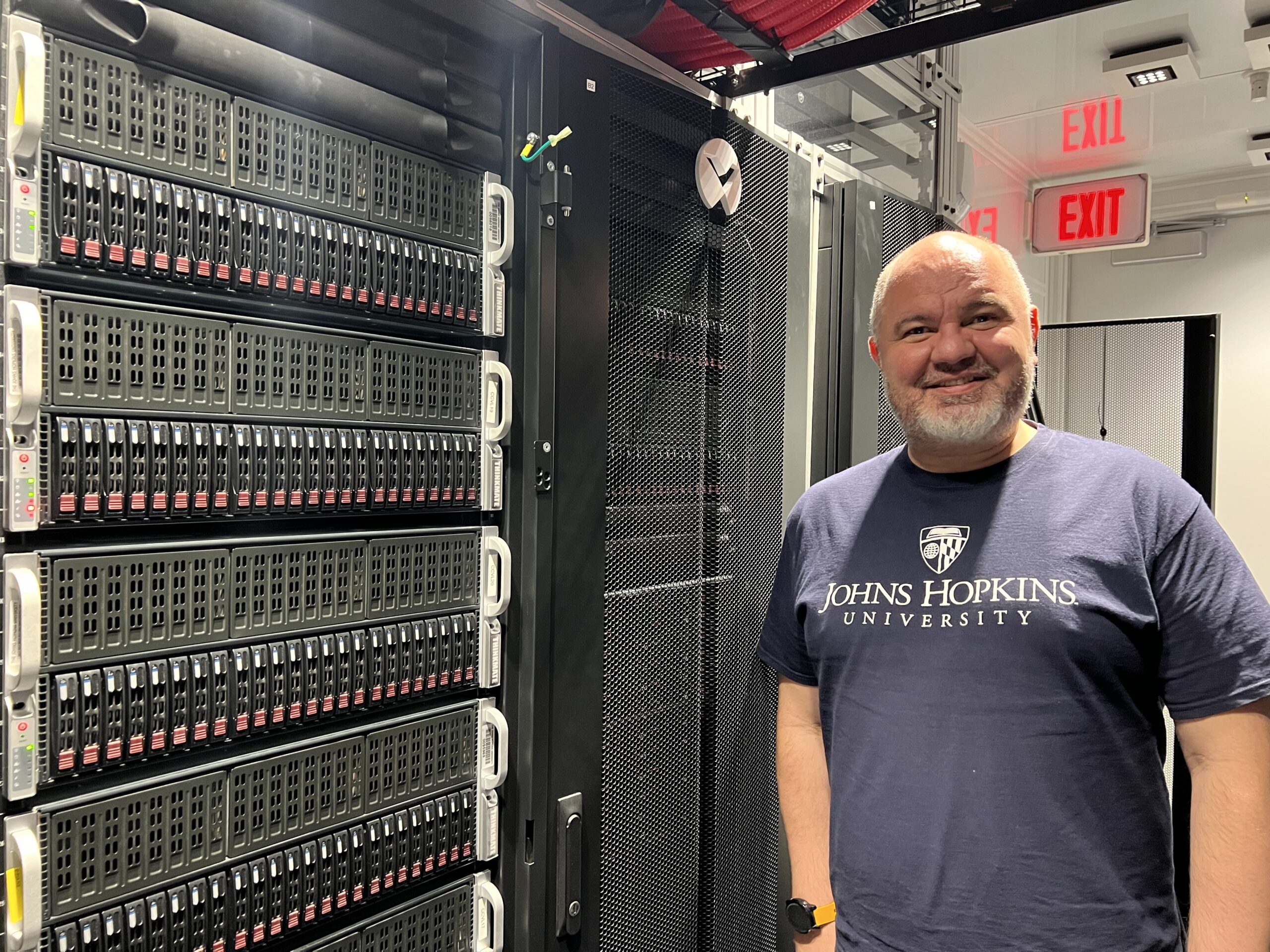Staff Spotlight:
Ricardo Jacomini

Ricardo Jacomini began his journey at Hopkins in 2018 as a Postdoctoral Fellow. Following that, he contributed to ARCH as a Software Engineer for two years before transitioning to the position of Assistant Research Scientist.
q. What is you role at arch?
RJ: “My responsibilities include managing batch systems like SLURM and Open-OnDemand, troubleshooting job issues, defining policies, and exploring new tech in High-Performance Computing (HPC) and Artificial intelligence (AI).
Moreover, I spearhead a few projects aimed at simplifying software installation to support our scientific community better.”
q. What inspired you to pursue the career you have today?
RJ: “My academic journey started during my Applied Mathematics (BSc) in 1998, where I recognized the growing significance of GNU/Linux. Pursuing certifications in CCNA, MCSE, LINUX Administration/Security, and programming languages like QT, C/C++, and JAVA equipped me with foundational skills. These certifications led to roles as a system administrator and technology school professor until 2017.
I started diving into AI Techniques and HPC environments, embarking on advanced education. This journey led me through a master’s and doctorate program, where I dedicated my research to exploring AI applications across domains, particularly emphasizing pioneering advancements in Biomedicine.
While I pursued my Master’s at The Federal University of ABC in 2010, I ventured into developing feature engineering and computational vision models, utilizing HPC infrastructure for classifying breast lesions on mammograms. This experience involved extensive use of MPI libraries and C++ and MATLAB engines, fostering my expertise in HPC environments.
In 2013, during my doctoral research at the University of São Paulo, I focused on developing a framework for gene regulatory networks (GRNs) inference, employing advanced AI models within the context of a malaria database.
Upon finishing my doctorate while already engaged as a professor and advisor, I had the privilege of serving as an advisor to 17 undergraduate students, nurturing their academic growth. However, I felt a deeper exploration was necessary in my research endeavors. This led me to transition into pivotal postdoctoral roles at Johns Hopkins Medicine and the Lieber Institute for Brain Development in 2018. Here, my focus was dedicated to significantly enhancing machine learning methodologies for the detection of L1-associated somatic mosaicism within cells, leveraging the immense capabilities offered by HPC and AI.
Cultivating deep involvement across various domains within AI and HPC led me to transition to the pivotal role at ARCH in 2021. With a strong background in Computational Biology, Artificial Intelligence, and High-Performance Computing (HPC), I found a natural alignment between my expertise and ARCH’s objectives. This match isn’t just beneficial for me: I believe it benefits both myself and the team at ARCH.”
q. What’s your favorite aspect of your job?
RJ: “I possess a deep passion for perpetual learning and engagement across diverse projects and technologies. Yet, what truly ignites my enthusiasm is the prospect of collaborating with individuals from varied backgrounds. Interacting with users of diverse nationalities and cultures substantially enhances my work experience. Within this team, I have the chance to leverage and appraise cutting-edge technology, thereby incorporating richness and innovative viewpoints into my ongoing projects.”
q. What is the most interesting project you've worked on here?
RJ: “One of the most compelling projects I have been working on is Open OnDemand. This project significantly enhances accessibility to our HPC environment and scientific applications to our research community by providing remote and friendly web access. It simplifies access, particularly for individuals with beginner-level computer proficiency, allowing an intuitive usage of our applications with just a few clicks.”
q. What is a skill that’s important to have in your role?
RJ: “A key skill for supporting researchers within an HPC environment involves adept problem-solving and troubleshooting abilities. This skill enables efficient identification and resolution of issues related to resource utilization, workflow design, and research reproducibility. By employing a systematic approach to problem-solving, individuals can effectively assist the research community by optimizing code, diagnosing system bottlenecks, and ensuring the smooth functioning of HPC resources, ultimately aiding researchers in achieving their scientific goals effectively and reproducibly.”
q. What are your goals for the next few months/years?
RJ: “In the immediate future, my focus is refining my proficiency in key technologies like Simple Linux Utility for Resource Management (SLURM). I intend to play a facilitating role between our systems team and the scientific group by leveraging insights derived from historical jobs data using advanced AI techniques and state-of-the-art solutions. I aim to enhance and optimize the efficiency of our resource management processes, elevating their overall effectiveness.”
q. What do you like to do outside of work?
RJ: “I enjoy hanging out with friends and family. Whenever possible, I love traveling, exploring new places, and immersing myself in different cultures.”
